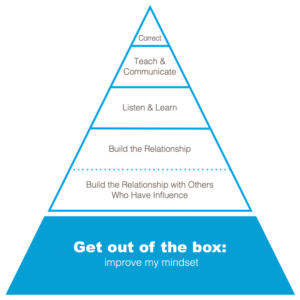Law enforcement stands at an important crossroads in light of major incidents that have attracted the national spotlight, calls for police reform, and challenges surrounding community trust and engagement. With a changing environment and the uncertainty facing law enforcement officers and leaders, the question becomes: How can we help officers improve communication, lessen conflict and build trust within the agency and the community? The answer to this question begins with the agency and its culture.
What change can law enforcement as a profession make to prevent future tragedies, increase safety and professionalism, and bridge the gap between the police and the community? It all starts with mindset—on both a cultural and individual level. In the recent Lexipol webinar, “Developing a Culture of Accountability: Outward Mindset & Active Bystandership,” Chief Ken Wallentine, Desmond Lomax of The Arbinger Institute and Chief Blair Barfuss share about the process of culture change in law enforcement agencies and what the results can look like.
Inward Mindset vs. Outward Mindset
Understanding the root of our mindset—and how to shift it—is critical to transforming the work of law enforcement and our relationship with the community. “How can we overcome things like low morale, stagnation, blame, silos and tunnel vision in the midst of pressure that’s putting us in a position where it’s hard to not be self-focused?” asks Lomax. First, we must understand that our natural tendency is toward a “me”-focused, inward mindset. Our default mindset sees others as objects that either help or hinder us in accomplishing our goals. On the flip side, an outward mindset is intent on seeing people as people, with their own needs, challenges and objectives. Understanding the depth and richness of experience and life that others have can and should influence our interactions with them—that’s what an outward mindset seeks to employ.
In law enforcement, this type of mindset makes a difference: “A focus on relationships and on the priority of relationships helps in assessing one another’s needs and being able to see our impact,” explains Chief Wallentine. He has seen success in his agency through implementing outward mindset training. “We began to understand that mindset was driving our behavior,” and therefore changing the mindset was key to changing internal and external relationships. Public safety professionals operating out of a sense of service and actively working to see people as people are more effective and build greater trust on all fronts. Chief Wallentine notes that leaders must model this approach first and foremost. “We have a saying in my department, ‘You’re inside the box,’ and my officers will tell me that,” he says. It’s about holding one another accountable in a way that is also supportive.
Understanding the root of our mindset—and how to shift it—is critical to transforming the work of law enforcement and our relationship with the community.
The Pyramid of Influence
Influence must be earned. There must be a basis for influence in any circumstance—within an agency or out in the community. Our natural method of influencing begins with correction (how else will people learn, right?). But an outward mindset and the culture law enforcement agencies should be working toward challenges this idea. Rather than beginning at the top of the pyramid (“correct”), it pays to start at the bottom of the pyramid.
The pyramid ultimately begins with you and your mindset. An outward mindset can help you set the tone for the relationships and interactions you have with others. Next, you work to build the relationship through developing mutual trust. In doing so, it is critical to listen and learn. With an outward mindset, you can better understand the needs and challenges of those around you—both under your supervision and in your community. As you continue to move up the pyramid of influence, you can utilize the trust and influence you have gained to communicate your purposes, needs and challenges through a teaching relationship. At this point, correction, when necessary and done well, will be better received and implemented.
A Culture of Accountability
So, what does all this have to do with law enforcement? And how can it feed into a culture change in law enforcement agencies across the country? A better understanding of our own mindset and the ways in which we relate to others can help us act with greater integrity every time. Chief Wallentine explains: “Intentional relationships nurtured by deliberate proximity, supported by sound policy and training, and a firm belief that ‘you matter like I matter,’” builds the type of relationships we want with our communities. This culture displays itself operationally and tactically in intervention, administratively through discipline and supervision, and relationally through trust. All these elements perpetuated by a rightly positioned agency culture improve professionalism and outcomes.
Such a culture also encourages officers to actively engage and build relationships with the community, leading to greater involvement and harmony when challenges arise and community support is needed. We must be accountable not only to each other, but to our communities. Learn more in our recent webinar, “Developing a Culture of Accountability: Outward Mindset & Active Bystandership.”




